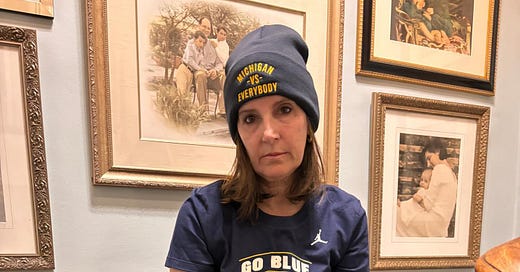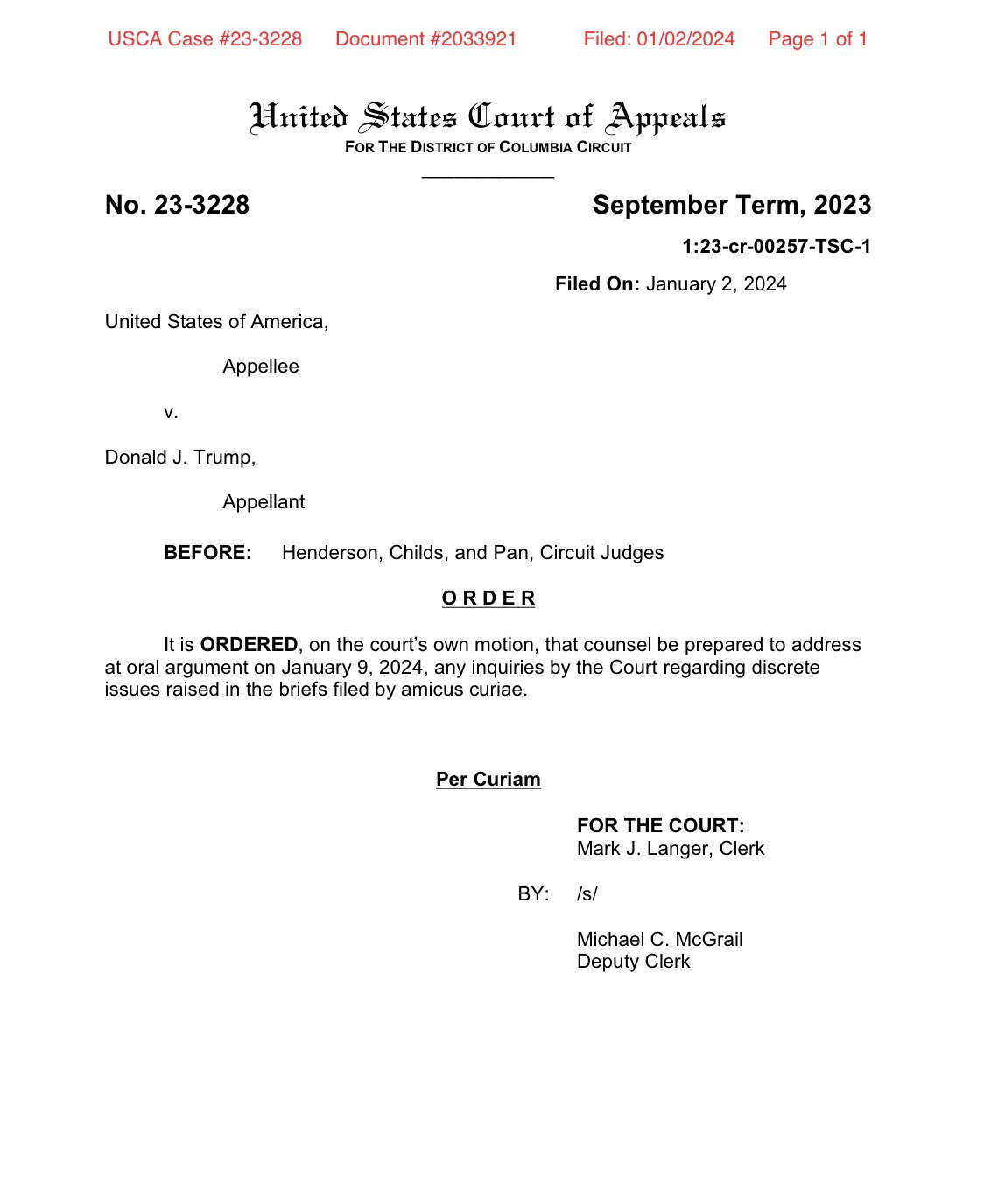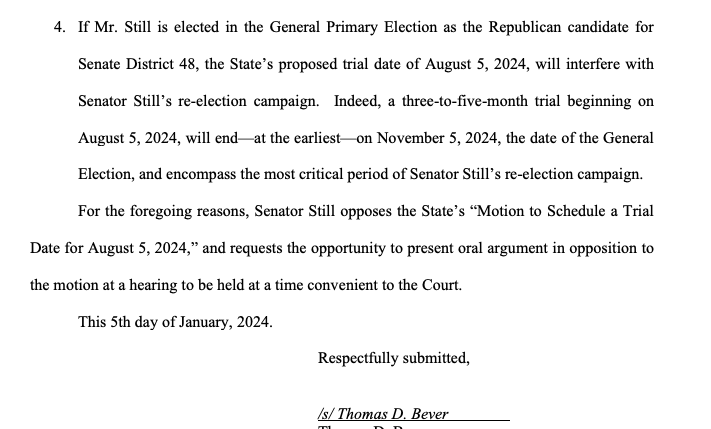There is our first “Week Ahead” written in 2024, and I need to confess that I’m still in fear of slipping and writing 2023. In an era where I can’t remember the last time I had to write a check, I just know it’s coming, and I’ll mea culpa in advance now for the inevitable moment when that happens.
Trump’s Presidential Immunity Defense Appeal
This week, the main event happens on Tuesday, when the Court of Appeals for the District of Columbia hears oral argument on Trump’s immunity motion—his effort to knock out his federal prosecution by the Special Counsel in Washington, D.C.
You can listen to the argument, conducted before a three-judge panel, at a link that should pop up here. Or find it on the court’s website here.
As I noted last week, Trump should lose the presidential immunity argument. The only real question is how fast that happens and whether Jack Smith can hang on to his March trial date/how far forward it slips. I wrote a piece for MSNBC Daily on January 2, arguing that the courts have an obligation to decide all of these Trump matters quickly and that they are capable of doing that if they’re committed to the rule of law. Since then, both the immunity motion and Trump’s appeal of the Colorado decision that would remove him from the ballot in the state because of the 14th Amendment have been expedited. It’s still a long way from here, to decisions in these appeals, to trials, to an election where Americans are fully informed about Trump, but it’s a step in the right direction.
We’ve discussed the arguments Trump made in his motion previously. A good refresher, from when he filed his motion on October 6, is here. The appeal being heard Tuesday is of Judge Chutkan’s order declining to dismiss the prosecution on presidential immunity grounds. We discussed her decision here. She concluded that Trump’s “four-year service as Commander in Chief did not bestow on him the divine right of kings to evade the criminal accountability that governs his fellow citizens.” That seems like a pretty compelling principle of law.
The Court of Appeals put the parties on notice last week that it might also consider arguments raised in the amicus curiae brief. Amicus briefs are written by interested folks who aren’t parties to a case, literally “friends of the court.” They may raise additional arguments they believe favor one side or the other. The United States is often invited by the Supreme Court to file an amicus brief in a case it’s not involved in to explore any interests the government might have in the outcome.
Here, since the government is a party, the amicus briefs come from other groups. Since the court wasn’t specific, we don’t know which argument(s) are in their sights. The four amicus briefs are:
A brief filed by a conservative group that includes former Trump lawyer Ty Cobb and former Dan Quayle Chief of Staff Bill Kristol. They argue the textualist view that presidential immunity isn’t mentioned in the Constitution and shouldn’t be implied here while arguing that giving Trump the benefit of immunity would damage the separation of powers and make presidents kings.
American Oversight bills itself as a nonpartisan, nonprofit watchdog. Their brief makes a technical legal argument that the denial of Trump’s immunity motion doesn’t qualify for interlocutory (before trial) appeal, and the case should be sent back immediately to the trial court. No other party has raised this argument. The argument is based on a case called Midland Asphalt. (Any success in this regard would likely be appealed by Trump to the Supreme Court, so, more delay).
A group of conservative former officials from five Republican administrations (Nixon to George W. Bush) filed a brief arguing that because Trump’s conduct involves trying to overturn an election, he violated the Executive Vesting Clause in Article II, Section 1, of the Constitution, so he’s not entitled to immunity. They agree with Judge Chutkan that it “would betray the public interest” to give a former President “a categorical exemption from criminal liability” for “attempting to usurp the reins of government.” They argue that under the Executive Vesting Clause, the court should hold that immunity doesn’t prevent the prosecution of a former first-term President whose alleged criminal conduct involves efforts to overturn an election he lost, even if presidential immunity for other acts might exist.
Former Attorney General Edwin Meese III filed a brief along with two other law professors arguing the pedantic point that the Special Counsel’s appointment is Constitutionally defective, so the entire case against Trump must be dismissed. Hunter Biden is probably a fan of this argument too, but a friend who is well-versed in the Special Counsel statute assures me this one is a “stone cold loser.”
Fulton County
Lots to anticipate on Tuesday. But before we get there, Fulton County defendants must file all of their motions in limine by Monday, except for Mark Meadows, Jeff Clark, and David Shafer, because they still have pending removal appeals. Meadows is apparently so intent on pursuing his appeal, despite a stinging 3-0 loss written by the chief judge of the Eleventh Circuit, that he has hired noted conservative Supreme Court lawyer and former Solicitor General Paul Clement and asked for en banc review by the full Eleventh Circuit, signaling his intent to take the matter all the way to the Supreme Court.
Late last week, some of the defendants filed motions in advance of the deadline.
Defendant Shawn Still, a state senator who was indicted for his role as a Trump elector, is opposing Fani Willis' request to start the trial on August 5. He doesn’t want to have to go to trial while he’s running for reelection and has gone so far as to ask the court to delay any further proceedings until the end of the legislative session in Georgia on April 18, because he has work to do as a state senator. Undoubtedly, every criminal defendant with a job would like this same benefit. “Your honor, I plan on asking for a raise in 6 months, so I’m going to need a trial postponement, and also I have a report due in a few months, so no more work getting ready for trial before that’s done.”
Most of the other motions filed so far have challenged the indictment, saying it’s insufficient to charge a crime that should be tried either because the facts the government alleges don’t add up to criminal conduct or for various legal flaws. Other defendants have already filed similar motions and although the Judge has held argument on some of them, he has not ruled yet.
Also last week, the Judge denied a motion from Rudy Giuliani for an “indefinite” extension of time in which to file his pre-trial motions. The Judge wrote that Giuliani failed to offer any justification for the motion.
Civil Fraud in New York
Thursday New York state Judge Arthur Engoron will hear closing arguments in the state attorney general’s civil fraud case against Trump and the Trump Organization. Engoron has already ruled the Trumps will be out of the real estate business in New York but has yet to order how much of their illegally-gotten profits must be repaid to the state. And the real issue here is likely to be whether Trump can stave off the corporate death on appeal, which should proceed as the election plays out.
In her closing brief, Attorney General Letitia James asked Judge Engoron to impose more than $370 million in damages, over $100 million more than she had originally asked for, based on the fraud proven at trial. She also asked the Judge to impose a lifetime ban on Trump, prohibiting further participation in the New York real estate industry. She asked for a five-year ban on his sons, Don Jr. and Eric. In his closing brief, Trump characterized any errors as “innocent mistakes.”
Judge Engoron is due to issue his opinion later this month.
Michigan
On New Year’s Day, I lost a bet to my good friend Barb McQuade, former U.S. Attorney in Michigan and current professor of law at the University. I was sad The Tide lost, but I fulfilled my end of the bargain and donned the “fabulous” Michigan attire Barb sent to me. And to prove I’m a good sport, I’ll be pulling for Michigan Monday night, because I believe in being there for my friends. I’ll even use the Michigan coffee cup Barb sent me for my Monday morning cup of Joe. No matter our differences, we can always find a way to come together when it counts.
We’re in this together,
Joyce








At a time when turning on the news is guaranteed to be triggering, I come here to be informed 😬 but still keep hopeful🫣. Thank you for all you do, Joyce. I hope you realize how valuable you are to those of us who are feeling really scared about the future. 🥰
Possibly the most heart-broken photo I've ever seen. I hope the chickens are offering some comfort.